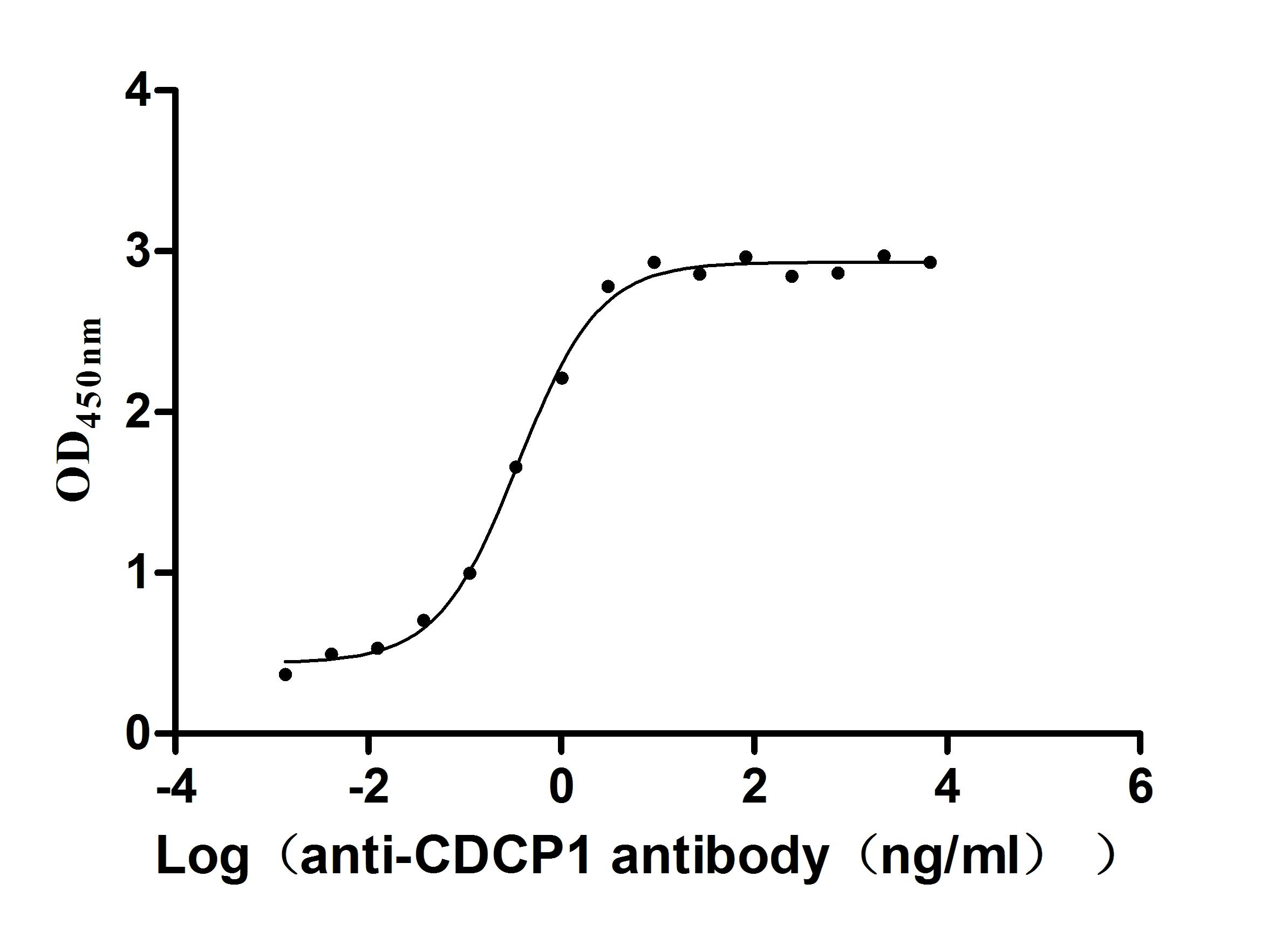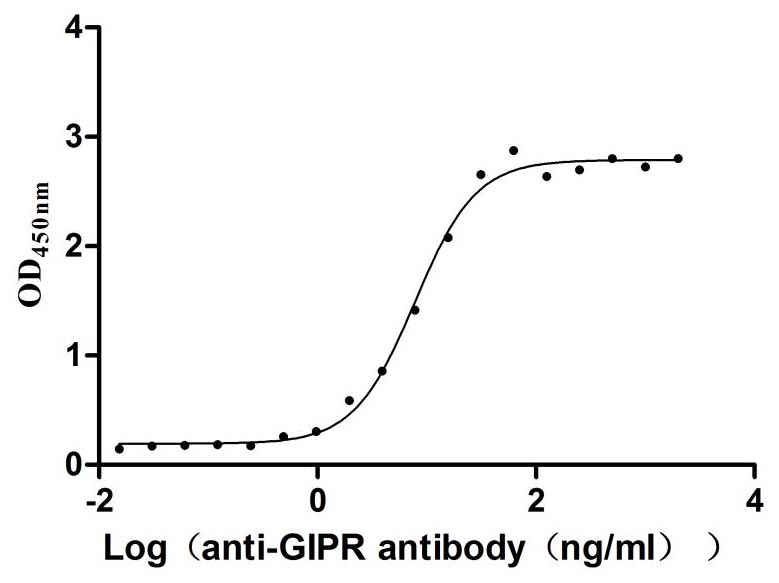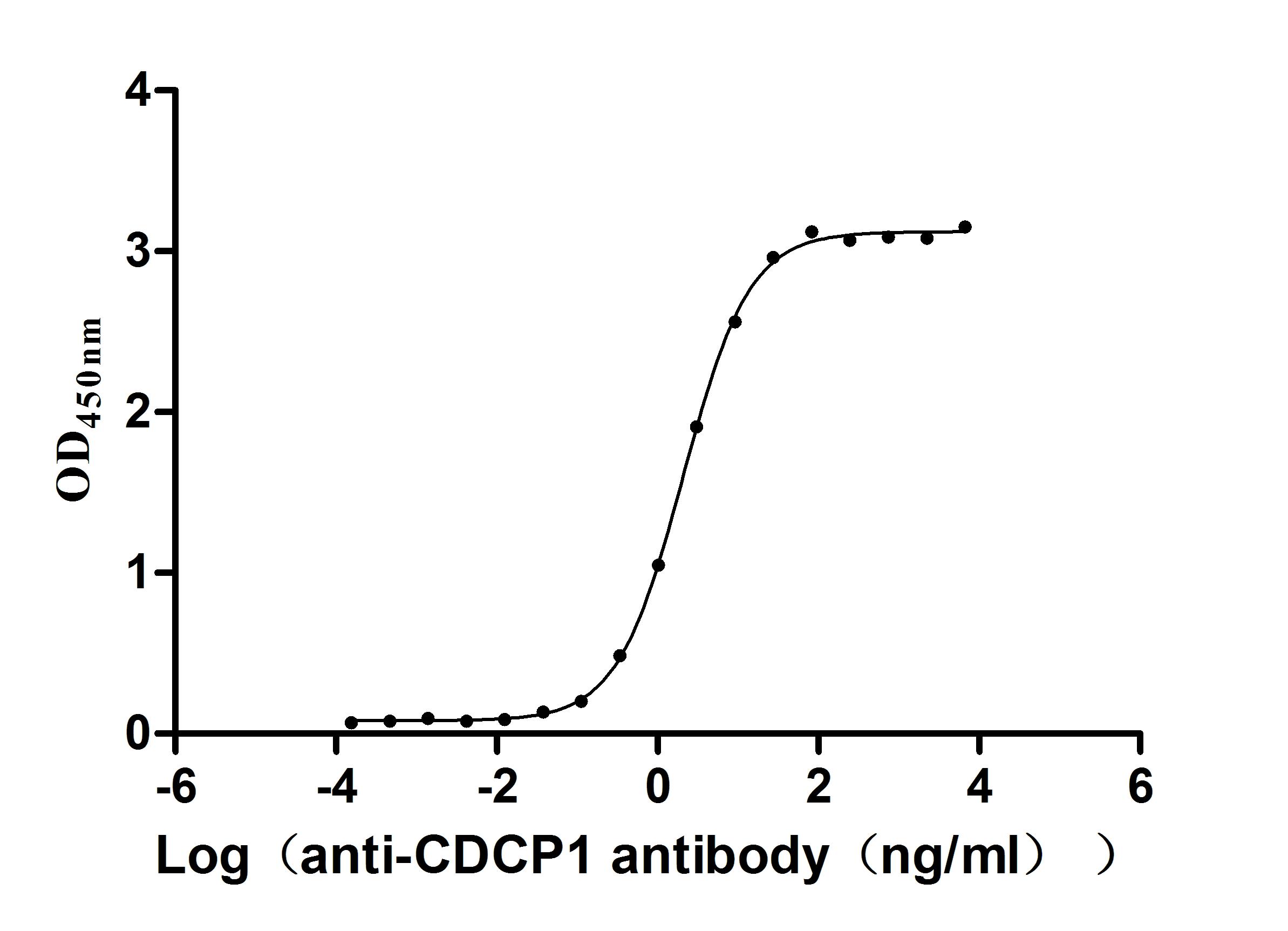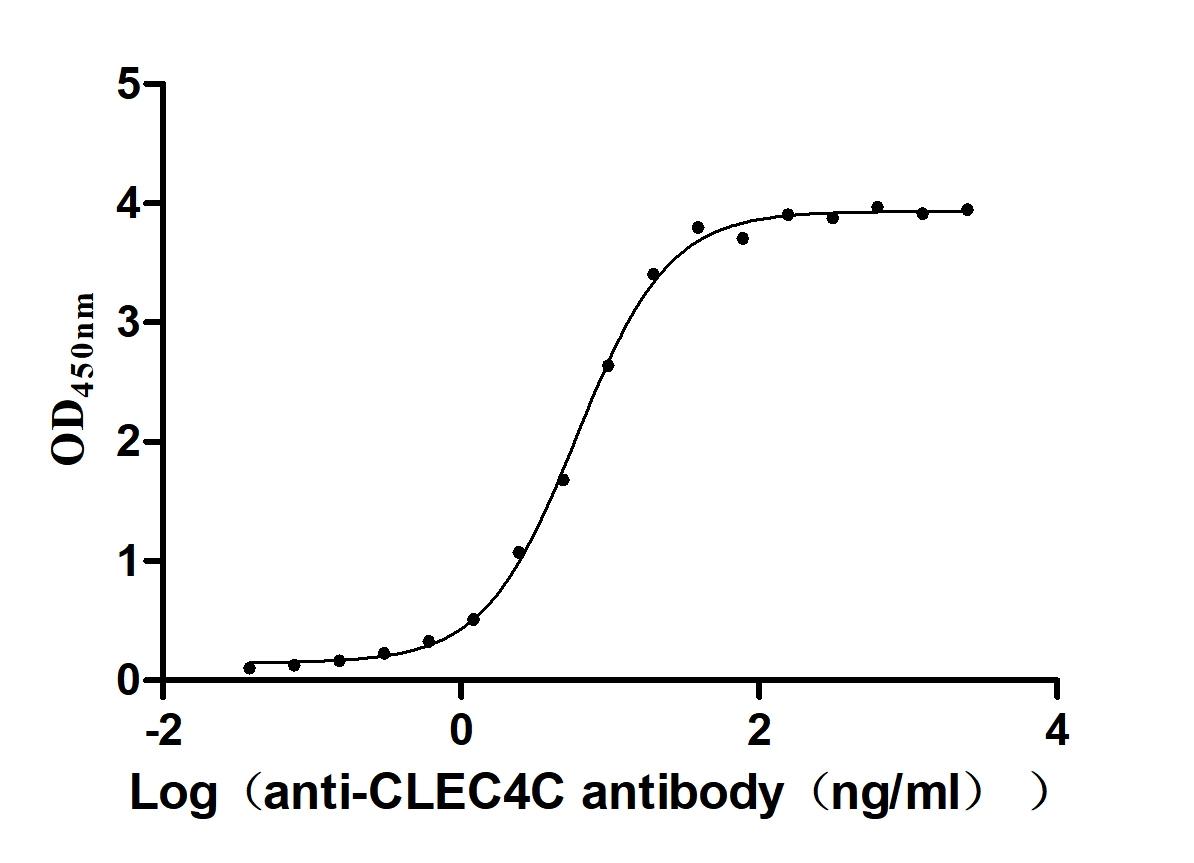Recombinant Human Protein max (MAX)
-
中文名称:人MAX重组蛋白
-
货号:CSB-YP013527HU
-
规格:
-
来源:Yeast
-
其他:
-
中文名称:人MAX重组蛋白
-
货号:CSB-EP013527HU-B
-
规格:
-
来源:E.coli
-
共轭:Avi-tag Biotinylated
E. coli biotin ligase (BirA) is highly specific in covalently attaching biotin to the 15 amino acid AviTag peptide. This recombinant protein was biotinylated in vivo by AviTag-BirA technology, which method is BriA catalyzes amide linkage between the biotin and the specific lysine of the AviTag.
-
其他:
-
中文名称:人MAX重组蛋白
-
货号:CSB-MP013527HU
-
规格:
-
来源:Mammalian cell
-
其他:
产品详情
-
纯度:>85% (SDS-PAGE)
-
基因名:
-
Uniprot No.:
-
别名:MAX; BHLHD4Protein max; Class D basic helix-loop-helix protein 4; bHLHd4; Myc-associated factor X
-
种属:Homo sapiens (Human)
-
蛋白长度:Full Length of Mature Protein
-
表达区域:2-160
-
氨基酸序列SDNDDIEVE SDEEQPRFQS AADKRAHHNA LERKRRDHIK DSFHSLRDSV PSLQGEKASR AQILDKATEY IQYMRRKNHT HQQDIDDLKR QNALLEQQVR ALEKARSSAQ LQTNYPSSDN SLYTNAKGST ISAFDGGSDS SSESEPEEPQ SRKKLRMEAS
-
蛋白标签:Tag type will be determined during the manufacturing process.
The tag type will be determined during production process. If you have specified tag type, please tell us and we will develop the specified tag preferentially. -
产品提供形式:Lyophilized powder
Note: We will preferentially ship the format that we have in stock, however, if you have any special requirement for the format, please remark your requirement when placing the order, we will prepare according to your demand. -
复溶:We recommend that this vial be briefly centrifuged prior to opening to bring the contents to the bottom. Please reconstitute protein in deionized sterile water to a concentration of 0.1-1.0 mg/mL.We recommend to add 5-50% of glycerol (final concentration) and aliquot for long-term storage at -20℃/-80℃. Our default final concentration of glycerol is 50%. Customers could use it as reference.
-
储存条件:Store at -20°C/-80°C upon receipt, aliquoting is necessary for mutiple use. Avoid repeated freeze-thaw cycles.
-
保质期:The shelf life is related to many factors, storage state, buffer ingredients, storage temperature and the stability of the protein itself.
Generally, the shelf life of liquid form is 6 months at -20°C/-80°C. The shelf life of lyophilized form is 12 months at -20°C/-80°C. -
货期:Delivery time may differ from different purchasing way or location, please kindly consult your local distributors for specific delivery time.Note: All of our proteins are default shipped with normal blue ice packs, if you request to ship with dry ice, please communicate with us in advance and extra fees will be charged.
-
注意事项:Repeated freezing and thawing is not recommended. Store working aliquots at 4°C for up to one week.
-
Datasheet :Please contact us to get it.
相关产品
靶点详情
-
功能:Transcription regulator. Forms a sequence-specific DNA-binding protein complex with MYC or MAD which recognizes the core sequence 5'-CAC[GA]TG-3'. The MYC:MAX complex is a transcriptional activator, whereas the MAD:MAX complex is a repressor. May repress transcription via the recruitment of a chromatin remodeling complex containing H3 'Lys-9' histone methyltransferase activity. Represses MYC transcriptional activity from E-box elements.
-
基因功能参考文献:
- MAX inactivation is a common event in GIST progression, fostering cell cycle activity in early GISTs. PMID: 28270683
- MAX to MYCN ratio that can account for tumour progression and clinical outcome in neuroblastoma. PMID: 29408445
- To our knowledge, this is the first report of an association between dysregulation of the MAX-MYC network in the brain and a behavior, suggesting a novel approach for exploiting the neuroplasticity associated with depression PMID: 27727240
- Sequence-specific DNA binding by MYC/MAX to low-affinity non-E-box motifs PMID: 28719624
- The SDHA, TMEM127, MAX, and SDHAF2 genes contribute to hereditary pheochromocytoma and paraganglioma. PMID: 28384794
- These results suggest that the wild type Max homodimer is important for attenuating the binding of c-Myc to specific and non-specific DNA, whereas alternative splicing (e.g. DeltaMax) is unable to do so. Conversely, the splicing of Max into DeltaMax could provoke an increase in overall chromatin bound c-Myc. PMID: 28350847
- evidence that MAX can 'sense' the oxidation status of 5mCpGs, and that cancer-associated mutations in MAX differentially affect binding to these features PMID: 27903915
- The mechanism of inhibition of c-Myc transcriptional activity by Miz-1 that binds c-Myc while competing for binding with Max has been described. PMID: 27859590
- The introduction of wild-type MAX cDNA into PC12 cells significantly decreased MYC's ability to bind to canonical E-boxes, while pathogenic MAX proteins were not able to fully repress MYC activity. Further clinical and molecular evaluation of variant carriers corroborated the results obtained with the functional assessment. PMID: 26070438
- Celastrol and some of its quinone methidecontaining analogs directly inhibit c-Myc-Max heterodimers in tumor cells. PMID: 26474287
- our results confirm that MAX is a tumor suppressor gene for renal oncocytomas PMID: 26670126
- In addition, loss of function mutation of the MAX gene was identified for the first time in GIST, and a broader role for MAX in GIST progression was suggested. mechanism for a subset of sporadic gastrointestinal stromal tumors PMID: 26555092
- We confirmed that these dimeric inhibitors directly bind to Myc blocking its interaction with Max and affect transcription of MYC dependent genes. PMID: 25875098
- MYC is part of a network of bHLHLZ proteins centered on the MYC heterodimeric partner MAX and its counterpart, the MAX-like protein MLX. PMID: 24857747
- Myc and its obligate heterodimeric partner, Max, are integral to the coordinated recruitment and post-translational modification of components of the core transcriptional machinery. PMID: 24657798
- Here we review the activities of MYC, MNT and other MAX interacting proteins in the setting of T and B cell activation and oncogenesis PMID: 24731854
- MAX mutations remain unusual events in Swedish patients with pheochromocytoma and paraganglioma tumours. PMID: 23743562
- Hypoxia reduces MAX expression in endothelial cells by unproductive splicing PMID: 25451222
- Genetic and molecular findings provide powerful evidence that MAX is a tumor-suppressor gene involved in SCLC development. PMID: 24362264
- Max mutation is associated with pheochromocytomas and paragangliomas. PMID: 24676840
- Delta Max, but not full-length Max, rescues Myc-dependent glycolytic gene expression upon induced EGFRvIII loss, and correlates with hnRNPA1 expression and downstream Myc-dependent gene transcription in patients. PMID: 23707073
- Data show that Sirt1, p53, and p38(MAPK) are involved in the detrimental phenotype of Max-null ESCs. Analyses revealed these proteins are involved at varying levels to one another in the hierarchy of the pathway leading to cell death in Max-null ESCs. PMID: 22696478
- germline mutations in MAX are responsible for 1.12% of hereditary and sporadic pheochromocytoma and paraganglioma in patients without evidence of other known mutations PMID: 22452945
- New structural determinants for c-Myc specific heterodimerization with Max and development of a novel homodimeric c-Myc b-HLH-LZ. PMID: 22733550
- Max b-HLH-LZ can transduce into cells and inhibit c-Myc transcriptional activities PMID: 22384171
- Genetic variants in MAX does not contribute to the development of Lynch syndrome. PMID: 22086303
- The E-box binding factors Max/Mnt, MITF, and USF1 act coordinately with FoxO to regulate expression of proapoptotic and cell cycle control genes by phosphatidylinositol 3-kinase/Akt/glycogen synthase kinase 3 signaling. PMID: 21873430
- The transcription factors Max and RXRalpha bind directly to the miR-193a promoter and inhibit miR-193a expression during transformation, thereby activating the PLAU and K-Ras oncogenes. PMID: 21670079
- MAX mutations are associated with hereditary pheochromocytoma. PMID: 21685915
- Enforced miR-22 expression presumably lowers Max levels available for Myc binding, which differentially influenced the transcription of downstream targets of the Myc-Max complex. PMID: 20214878
- downregulation of MYCN was reflected in a decreased MYCN/Max DNA-binding activity while the Mnt/Max binding did not change during differentiation PMID: 15258910
- High levels of Max and stress-induced NFkappaB activation may result in elevated expression of Fas ligand in human lung cancer cells and possibly contribute to Fas ligand-associated immune escape mechanisms. PMID: 15302589
- C6-cer inhibited the DNA-binding function of the c-Myc/Max oncogene PMID: 16201965
- Binding affinities & thermodynamics of dimerization of Max-Max homodimer & c-Myc-Max & Mad-Max heterodimers were determined.c-Myc & Max form most stable heterodimer.Polylysine had little effect, polyglutamic acid stabilized both heterodimers & homodimers. PMID: 16475822
- results uncover novel post-translational modifications of Max and suggest the potential regulation of specific Max complexes by p300 and reversible acetylation PMID: 17217336
- The switch from Mnt-Max to Myc-Max during bile duct ligation (cholestasis) and in hepatocytes treated with lithocholic acid is responsible for the induction in p53 and cyclin D1 expression and contributes to apoptosis. PMID: 19086036
显示更多
收起更多
-
相关疾病:Pheochromocytoma (PCC)
-
亚细胞定位:Nucleus. Cell projection, dendrite.
-
蛋白家族:MAX family
-
组织特异性:High levels found in the brain, heart and lung while lower levels are seen in the liver, kidney and skeletal muscle.
-
数据库链接:
HGNC: 6913
OMIM: 154950
KEGG: hsa:4149
STRING: 9606.ENSP00000351490
UniGene: Hs.285354
Most popular with customers
-
Recombinant Human CUB domain-containing protein 1 (CDCP1), partial (Active)
Express system: Mammalian cell
Species: Homo sapiens (Human)
-
Recombinant Rat Gastric inhibitory polypeptide receptor (Gipr), partial (Active)
Express system: Mammalian cell
Species: Rattus norvegicus (Rat)
-
Recombinant Macaca fascicularis CUB domain containing protein 1 (CDCP1), partial (Active)
Express system: Mammalian cell
Species: Macaca fascicularis (Crab-eating macaque) (Cynomolgus monkey)
-
Recombinant Macaca fascicularis C-type lectin domain family 4 member C(CLEC4C), partial (Active)
Express system: Mammalian cell
Species: Macaca fascicularis (Crab-eating macaque) (Cynomolgus monkey)
-
Recombinant Human Tumor necrosis factor ligand superfamily member 15(TNFSF15) (Active)
Express system: Mammalian cell
Species: Homo sapiens (Human)






-AC1.jpg)










